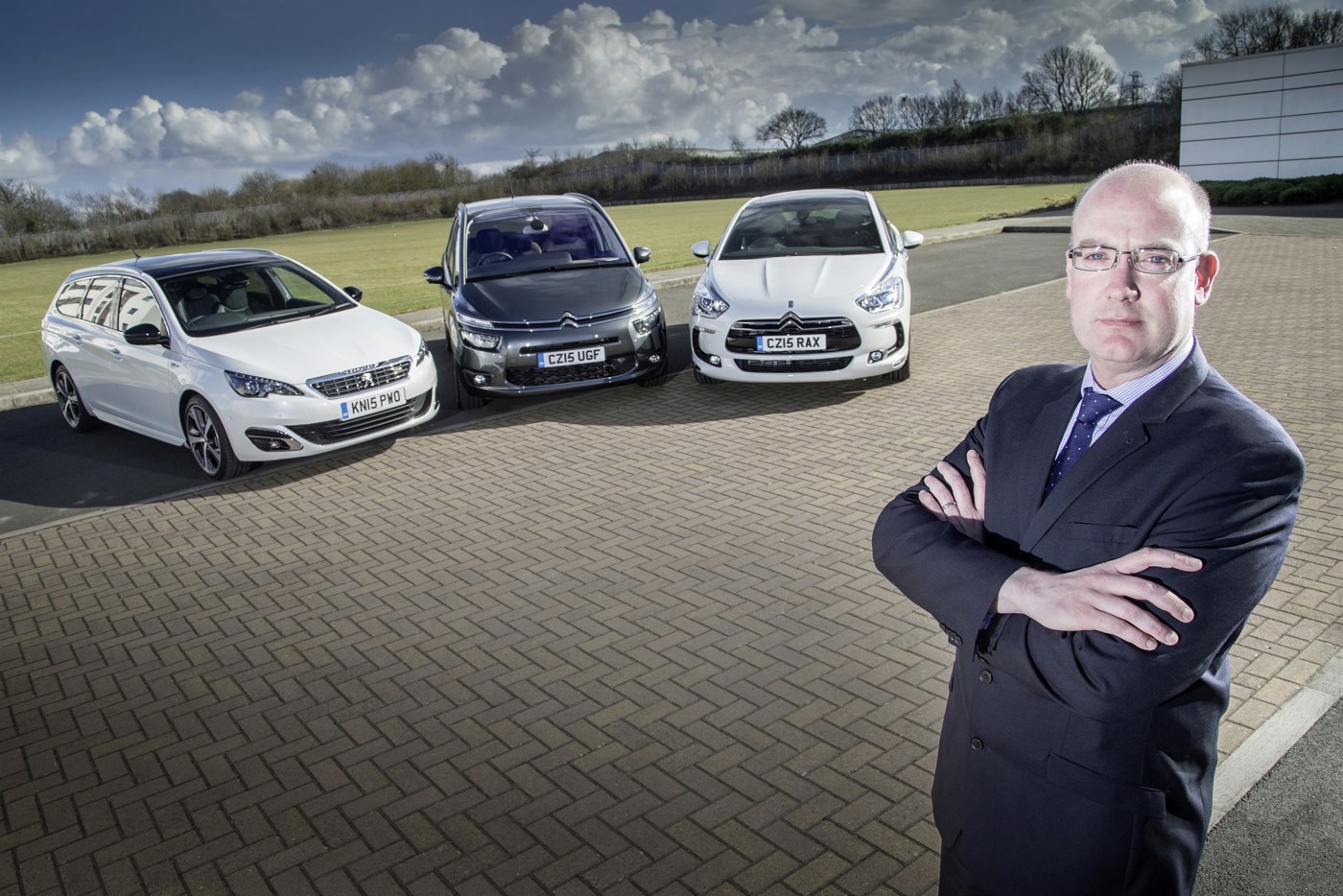Skip back three years: Citroën disclosed plans to vacate its Slough head offices, where it had been based for more than 80 years, to move in with sister PSA brand Peugeot at its new HQ in Coventry.
The speculation commenced. Would this mark the beginning of a joint PSA approach to the market? Both companies downplayed the significance of the relocation, admitting that there would be some back office synergies, but little else. However, last year came the announcement that a number of key roles would become group-specific rather than divided by brand. They included the position of fleet director.
Around the same time, PSA announced it would separate the DS brand from Citroën as it looked to create a premium force to compete against the likes of Audi, BMW and Mercedes-Benz.
Peugeot director of fleet and used vehicles Martin Gurney was appointed to the PSA group fleet role; his counterpart at Citroën, Martin Hamill, has since moved to a new role of director, quality & the academy at the company.
In his first interview since taking up the position, Gurney admits he could have easily been overwhelmed by the scale of the integration. “This was an organisation that steadfastly kept its fleet departments apart – the question was ‘where do we start?’,” he says.
The answer was to look at the structure of the two fleet teams from the perspective of the customer, focusing on four key components: used vehicle operations, corporate sales, fleet sales operations and leasing/rental.
Upon closer inspection, some elements required less adjustment than others. Used cars, for example, were distinct Peugeot and Citroën operations on paper, but in reality they both reported into Martin Hamill; that arrangement will continue with Mark Spray controlling the remarketing for Citroën, Peugeot and DS as head of used vehicle operations. Other areas – particularly those which were customer-facing – weren’t quite so straightforward.
Citroën had seven area fleet managers, while Peugeot employed seven key account managers, each serving a dedicated part of the country.
“This was the hardest one for us to grapple with,” Gurney says. He has reduced the territories to six for each brand after benchmarking against the structures of key competitors. Each region will have a Peugeot corporate sales manager and a Citroën corporate sales manager (CSM) looking after both cars and vans.
Factfile
Company: PSA Peugeot Citroën
Director of fleet & used vehicles:
Martin Gurney
Brands: Citroën (cars and LCVs); Peugeot (cars and LCVs); DS
True fleet car sales 2014: Citroën – 25,109; Peugeot – 27,588
Van sales 2014: Citroën – 27,228; Peugeot – 31,867
Other fleet interests: Peugeot Contract Hire, Citroën Contract Motoring
“We have around 1,200 active corporate accounts – either outright purchase or contract hire – of which around 700 are Peugeot and 500 are Citroën,” Gurney says. “Only 100 are shared accounts, which tend to be multi-badge policy and large fleets.”
Shared accounts will be given a choice: to carry on dealing with both Peugeot and Citroën CSMs, or to just have one for both accounts. They can also choose which CSM, if they have a preference.
“We don’t want to undermine the relationship that we currently have, so we will give the customer the opportunity to choose to be more efficient in their communications if that’s what they want,” Gurney explains. “The feedback has been positive from our accounts – they are receptive to the changes and delighted that we asked them for their view.”
Gerry McCaffrey will head the two CSM teams, although he will have tri-band responsibilities. How DS fits into the fleet mix has yet to be established; it’s likely that both CSM teams will be involved – they will also be expected to open up cross-brand opportunities with solus accounts.
“We will focus our corporate sales teams on all three brands regarding developing business opportunities,” says Gurney. “If a Citroën CSM sees an opportunity for Peugeot, they will make the introduction for the Peugeot CSM.”
He accepts the logical conclusion that the majority of shared accounts, existing and future, will choose to deal with just one PSA contact: “We are convinced that, over time – possibly a two-year journey – organically, the vast majority of our accounts will end up being shared PSA accounts.”
Tenders will be handled in one of two ways: existing customers will continue to be separate; new business opportunities will be handled by one CSM for all three brands – another decision that will inch the company towards a tri-brand structure.
Gurney says: “It means that all three brands will have more opportunities; there will be more chances for us, as a group, to benefit.” However, he stresses: “The vast majority of our corporate accounts will see very little difference.”
The new PSA fleet department was officially created on April 1; the reorganisation will be complete by the end of June. A key benefit to merging the two fleet operations has been the unearthing of ideas and initiatives that existed only within one team, according to Gurney.
“We had a lot of great practice within the teams that the others weren’t aware of, such as around raising requests and fleet demonstrator programmes,” he says. “We have the opportunity to pick the best practice from the teams for all three brands.”
As part of the structural changes, PSA is investing in a new department within the corporate business called fleet operations. This back office function will be shared across the three brands and include three account managers, wholelife cost specialists and fleet admin – effectively pooling together everything beyond the customer-facing relationship. Fleet operations will be responsible for developing better, more efficient ways to work over the next 12 months which will benefit both PSA and its fleet customers.
The final remaining piece of the structural reshuffle involves leasing and rental. Peugeot national franchising manager Gareth Foden is to retire, with Frazer Grice moving into a group position.
“Feedback from the major leasing and rental companies is that they prefer to deal with one person, not two,” says Gurney. “It is all about residual value management and wholelife cost which is less a brand issue. It will be more effective for us and better for our customers.”
In addition to the four key areas involved with the fleet integration is a fifth area looking at SMEs – “the holy grail”, says Gurney.
This is the one area to remain completely brand-separate, with Nick Crossley taking the Peugeot role and Jeremy Smith the Citroën position. Both will report to the brand directors.
“We recognise that, where we are working with dealers to develop their business sales, we have to remain separate,” Gurney says. “There will be a notional dotted line to me but they are responsible for developing Peugeot, Citroën and DS with a proposition that remains separate.”
He adds: “Where we interact direct with our customer, i.e. where there is more focus on the brand, we are separate. It is logical to combine the back-office functions to save money and customers will see benefits because we will be easier to deal with.”
The three brands will operate under the same fleet strategy, one which mirrors the plan Gurney introduced to Peugeot just over a year ago. This consists of limiting exposure to so-called red channels – principally daily rental – and developing more profitable routes to market: corporate accounts, leasing and SMEs.
Gurney describes his group aspirations for cars as “achievable” for 2015, while also pointing to the clear distinctions between the three brands.
Citroën will focus on new models, C1 and C4 Cactus, and the SME market this year. There are no plans to grow daily rental. It is being positioned, according to PSA director of communications Andrew Didlick, as the “generalist brand, but with an edge, as summed up by the Cactus and Grand C4 Picasso. It is distinct and innovative and we will see that come more to the fore with future models”.
Peugeot is looking to grow by around 3,500 units, spread across the three true fleet channels, with further slight reductions in rental. It is being moved upmarket, focusing on interior quality and comfort. Both brands are targeted to have no more than 10% of their sales volume going into the rental market.
DS is on a journey in fleet; it is more of a long-term opportunity, although Gurney is convinced it has a role to play as a premium brand competing against Audi, BMW and Mercedes-Benz in the corporate market. The Citroën chevrons come off the DS5 from May production, with the DS3 and DS4 to follow suit later this year.
As well as the three brands remaining separate, PSA’s two UK leasing operations, Peugeot Contract Hire and Citroën Contract Motoring, will continue to be run separately.
'We are in a better place to grow now'
PSA Peugeot Citroën chairman Carlos Tavares visited the UK business in March to meet the senior team and address staff about the company’s growth strategy.
He has publicly praised the performance of the UK operation as he looks to turn around the fortunes of the European carmaker, partly by transforming it into a global manufacturer.
“Carlos Tavares is keen for us to invest in the areas of the business where it adds value,” Martin Gurney says.
“Where we are selling vehicles, there is more resource. We are in an infinitely better place to grow now than we were before.”
Bringing together the fleet operations, which mirrored similar moves in communications and parts, has not resulted in compulsory redundancies.
Staff losses – reported to be around 90 in total – have all been voluntary.
In fleet, the merger saw the headcount reduce from 14 to 12 (three members of the team took early retirement, leaving a gap for one new recruit).





















Login to comment
Comments
No comments have been made yet.